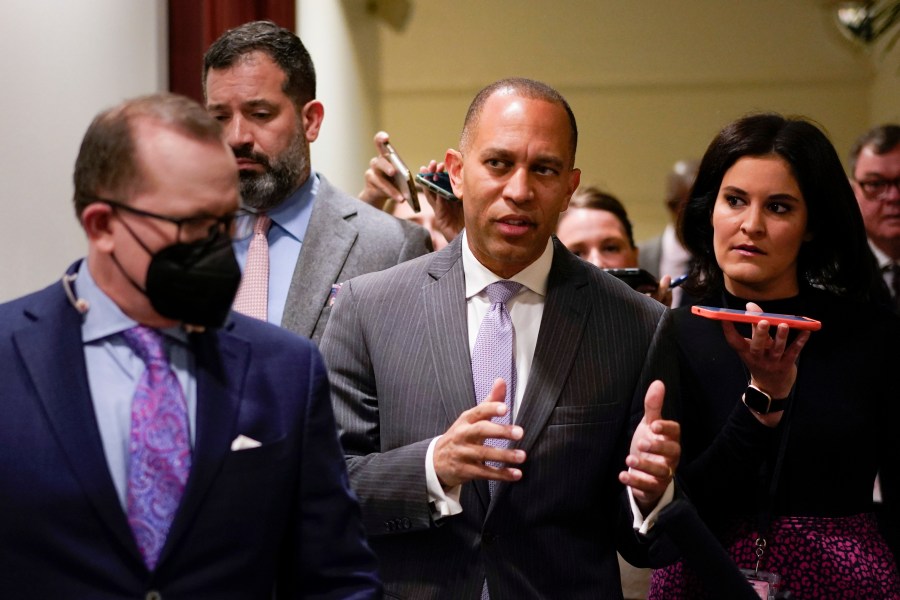(NewsNation) — In a historic turn of events, the U.S. House convened for a second day to elect a new Speaker. This is the first time in 100 years that a speaker was not elected on the first ballot.
To become Speaker of the House, 218 votes are needed from fellow members. While Democrat Rep. Hakeem Jeffries of New York is getting votes from his party, Republicans from the Freedom Caucus also gave McCarthy a challenger — Rep. Byron Donalds, R-Fla.
With the U.S. House coming under Republican control in the November election, factions have emerged resulting in GOP leader Kevin McCarthy not having enough support to win the speakership outright. After three rounds of unsuccessful voting Tuesday, lawmakers tried again Wednesday. However, the fourth vote failed, and as of early Wednesday afternoon, there still was no House Speaker.
NewsNation’s D.C. Bureau Chief Mike Viqueira explains how things got to this point in Congress, and what’s going to happen now.
Q: Why is it important that the House of Representatives can’t choose a speaker?
Without a speaker, “Nobody is sworn in, nobody can organize,” Viqueira said. “There are no committees. They can’t hire staff.”
Essentially, House members are not letting the government keep functioning and debating the issues of the day, he said.
Q: Why can’t Democrats and Republicans just compromise on a candidate for House Speaker?
That’s just not the way the House of Representatives works, according to Viqueira.
“The house is a fiercely partisan, what they call a majoritarian institution — the majority always rules,” he explained.
This didn’t just start recently, Viqueira said. It’s been the way the House is since the 19th century.
“Many of these members would just as soon dash their eyes out with hot pokers than vote for a member of the opposite party for Speaker of the House,” Viqueira said. “We’re in uncharted territory.”
Notably, Viqueira said, not one Democrat voted for anyone other than Hakeem Jeffries, the new Democratic leader from New York, to be the speaker. Meanwhile, the consensus appears to be both within the GOP, the widespread media and other political players that the Speaker debacle is not a good look for Republicans.

“The adage in politics, especially in the national legislature here in Congress, is ‘If your enemy is having a hanging party, then you just give enough rope and stand back and watch them do it,'” Viqueira said.
Those who object to McCarthy becoming speaker show absolutely no sign of backing down, which is why we have “the spectacle” in the House, Viqueira said.
“This Sisyphean struggle — they’re pushing the rock up the hill, they almost get there and then it falls to the bottom and they start over again,” he added.
Q: Is there a limit on how many times the House can vote?
There is no limit on how many votes can be taken.
Viqueira pointed out that there was one Speaker, Frederick Gillett, R-Mass., who eventually became Speaker after multiple tries in 1923. According to the Washington Post, Gillette was reelected on the ninth ballot. That took two months.
“Democracy marches on,” he said. “Look at the bright side. No one’s claiming the votes have been rigged.”
Q: What would have to happen for Democrats to get the seat?
While Jeffries is getting close to the number of votes he needs to become Speaker, in the fourth round of voting, he was six short —212 — of the 218 needed. But it is unlikely — and could even be political suicide — for House Republicans to vote for a Democratic speaker, Viqueira said.
“I think that we would have to go through this for an unimaginable amount of time, until there was a true not just political crisis here in Washington, but a crisis that demanded that the American people have their representatives actually functioning here in Congress,” Viqueira said. “What would that look like? Who would be the chairman of the committees if there were a Democratic Speaker but a Republican majority? Again, the Speaker of the House has so much power. And that’s part of what these rebellious MAGA-Republicans are so angry about.”
Q: Why won’t McCarthy give up?
Because no one knows how this will all end up, Viqueira says it’s just as possible of a resolution that Kevin McCarthy is elected speaker, though there’s likely “less than a 50% chance” of this happening in his opinion.
“Kevin McCarthy has said that he ‘had the longest speech on record on the House floor,‘ — quite a distinction,” Viqueira said. McCarthy’s said he’s willing to sit there as long as it takes until he’s elected speaker, Viqueira added.
McCarthy has also insinuated that there’s no one else in the Republican party that could get to the 218 votes necessary to become Speaker. “I would say the default candidate, if you had to choose one, would be the second-in-command who’s in line to be the majority leader, Steve Scalise of Louisiana,” Viqueira said. However, Scalise has remained loyal to McCarthy in the last several weeks, even nominating him to be Speaker.
“It’s not a foregone conclusion that Kevin McCarthy is going to lose this race in the end, and I think that’s why he’s sticking around,” Viqueira said.
